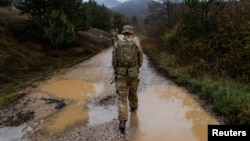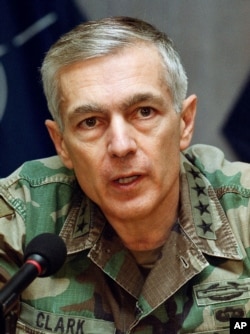Twenty-five years ago, NATO launched an air campaign to stop ethnic cleansing by Serbian forces against ethnic Albanians in Kosovo, then a province of Serbia in the former Yugoslavia. It was the first humanitarian intervention of its kind, and it was spearheaded by the United States.
The intervention started after Serbian strongman Slobodan Milosevic refused to sign a deal for interim broad autonomy for Kosovo. The air campaign lasted 78 days until June 10, 1999. The United Nations Security Council did not back the intervention, and critics say it was a violation of international law.
Reflecting on those events and their repercussions, retired General Wesley Clark — then the NATO Commander who led the air campaign — tells VOA he is proud of what the Alliance accomplished with that operation. He says the situation in the region is still unacceptable because Serbia doesn't recognize the independence of Kosovo. In light of Russia's aggression against Ukraine, Clark tells VOA's Keida Kostreci that a renewed Western push for normalization between Kosovo and Serbia is very much tied to what happens between Moscow and Kyiv.
This interview is edited for clarity and brevity.
VOA: General Clark, it has been a quarter century since NATO intervened in Kosovo to stop the ethnic cleansing. As NATO commander then, what are your reflections today after 25 years?
General Wesley Clark (retired): Well, I'm proud of the action that NATO took then to end the ethnic cleansing campaign directed against the Kosovar Albanians. I think NATO's action was done with minimum force, with every possible measure of precaution taken to avoid harming innocent civilians, and it still accomplished the purpose of halting the ethnic cleansing.
VOA: General Clark, at that time, there was a lot of debate internationally. [Humanitarian intervention] was not something that was done often. With the hindsight of today, how would you see that as a matter of international relations?
Clark: I would say that this was a necessary intervention advanced strictly for humanitarian purposes, and it accomplished its mission.
VOA: Do you see Kosovo today as you imagined it would be 25 years ago?
Clark: What we knew at the outset of the campaign was that we would put our NATO force in. We did not know at the time that the Serbs would leave completely. We never had any intention to split Kosovo or divide it in any way, or even to cause it to become independent.
However, the actions of the Serb military and police during the campaign, the ruthless murder of civilians, the efforts to eradicate Kosovar Albanians' holdings, the brutal conduct of neighbor against neighbor in this campaign, made it impossible really for the Serbs to stay.
And so, NATO did eventually call as one of its objectives that Serb forces must leave. What happened after that, under the international auspices of the United Nations, was that Kosovo decided it would become independent.
But the situation, to be honest with you, is still unacceptable in the region because Serbia doesn't recognize the independence of Kosovo, and Serbia is still interfering inside Kosovo, and the political pressures on Kosovo, as a smaller country are still very, very heavy and difficult.
VOA: Kosovo has been one of the most pro-American countries, and that was in a large part due to that intervention that you led. And now the relation between the U.S. and Kosovo, or at least between the governments, is at its lowest point. What would you say about that?
Clark: It is important to understand that two states that are side by side, Kosovo and Serbia, can't move forward in relationships if they're continuing to embroil themselves in each other. When the United States is asking both sides to come together, I think it has to put the heaviest pressure on [President Aleksandar] Vucic in Serbia. And the reason being, of course, Serbia is the larger country. It's the more powerful country. It's the country that has the greatest flexibility in this case.
And it's clear that Serbia hasn't yet really reconciled to the fact that this part, Kosovo, is independent today. And that's a recognition that has to come. It's an historical consequence of all the tensions and the feuds.
This deeply embedded historic friction between the two groups could only result in a separation of two nations. And now the two nations have to find ways to coexist, to get along, and to work together economically for the betterment of their citizens.
And that's the challenge, and it's a very difficult challenge to overcome.
Memories are still fresh on both sides, and I think it's a work and a labor that can't be forced, I think it has to come and move forward naturally.
And the problem is that the Russian action in Ukraine has further complicated the situation, because everyone understands that Serbia has an historic affiliation with Russia, and Russia is using Serbia to prepare the way for, should it succeed in Ukraine, causing greater chaos again in the western Balkans.
VOA: You mentioned the new geopolitical context with the war in Ukraine by Russia. Considering that there are critics who say it's because of the war that more pressure has been put on Kosovo, so that those challenges are not added.
Clark: With the [Russia-Ukraine] conflict, of course, it's normal and natural that the West would like to see this resolved, to see Serbia totally in the Western camp and affiliated with the European Union in the most positive way. But it's precisely because of the tensions between Russia and Ukraine that that's unlikely to happen. And so, the problems between Kosovo and Serbia seem to me to be the caboose on the train, so to speak.
And these problems reflect the larger geopolitical tensions in the region.
VOA: The latest threat assessment by the intelligence community in the United States in terms of the Balkans, mentions the situation between Kosovo and Serbia and Bosnia-Herzegovina as the points that could flare up.
Clark: I think it's a situation that certainly needs to be watched. As I said earlier, these tensions are inflamed by Russian efforts. Russia would like to spark discord and chaos in the area, and all the work that we do in the Balkans will not end fruitfully until we also address the issue between Ukraine and Russia.
VOA: Do you think that in this case, there needs to be a change in tactics and strategy in how the U.S. and the West in general deal with Kosovo and Serbia?
Clark: What I see is that whatever strategy we adopt, [it] is still held hostage to the fact of what's going on 1,000 miles or 800 miles to the east, along the Donbas or conflict zone, and what Russia's aims are. And on one hand, this is driving Europe to want to resolve this crisis between Serbia and Kosovo, and on the other hand, making it much more difficult to do so.
VOA: But is that right for the future of the normalization between the two countries?
Clark: I think the process is going to have to continue for a while, and I think it's a matter of keeping the process alive, and continue a dialogue. If we have a breakthrough, that would be wonderful, but I wouldn't anticipate a breakthrough. As I said, this is a secondary issue in Europe that is in many respects dependent on the outcome between Russia and Ukraine.





